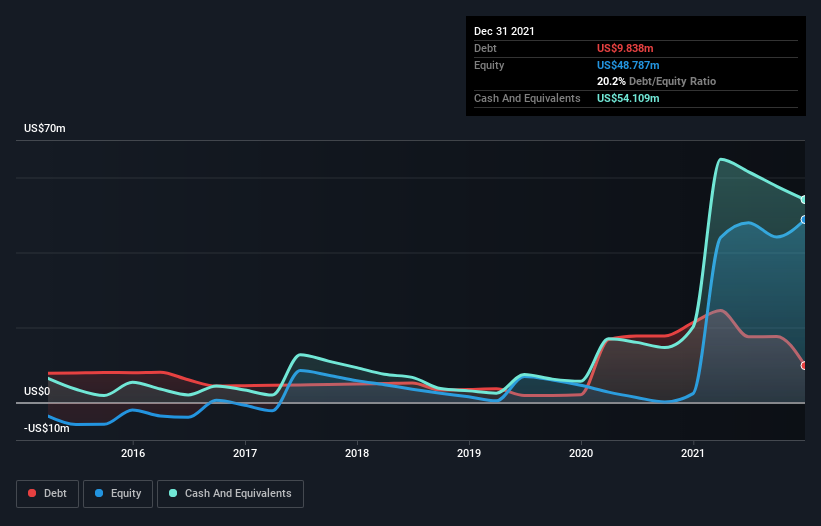Is ClearPoint Neuro (NASDAQ:CLPT) Weighed On By Its Debt Load?
Legendary fund manager Li Lu (who Charlie Munger backed) once said, 'The biggest investment risk is not the volatility of prices, but whether you will suffer a permanent loss of capital.' So it might be obvious that you need to consider debt, when you think about how risky any given stock is, because too much debt can sink a company. Importantly, ClearPoint Neuro, Inc. (NASDAQ:CLPT) does carry debt. But the real question is whether this debt is making the company risky.
What Risk Does Debt Bring?
Debt assists a business until the business has trouble paying it off, either with new capital or with free cash flow. Part and parcel of capitalism is the process of 'creative destruction' where failed businesses are mercilessly liquidated by their bankers. While that is not too common, we often do see indebted companies permanently diluting shareholders because lenders force them to raise capital at a distressed price. Of course, the upside of debt is that it often represents cheap capital, especially when it replaces dilution in a company with the ability to reinvest at high rates of return. When we think about a company's use of debt, we first look at cash and debt together.
View our latest analysis for ClearPoint Neuro
How Much Debt Does ClearPoint Neuro Carry?
The image below, which you can click on for greater detail, shows that ClearPoint Neuro had debt of US$9.84m at the end of December 2021, a reduction from US$21.3m over a year. But it also has US$54.1m in cash to offset that, meaning it has US$44.3m net cash.
How Strong Is ClearPoint Neuro's Balance Sheet?
We can see from the most recent balance sheet that ClearPoint Neuro had liabilities of US$4.75m falling due within a year, and liabilities of US$12.0m due beyond that. On the other hand, it had cash of US$54.1m and US$2.34m worth of receivables due within a year. So it actually has US$39.7m more liquid assets than total liabilities.
It's good to see that ClearPoint Neuro has plenty of liquidity on its balance sheet, suggesting conservative management of liabilities. Due to its strong net asset position, it is not likely to face issues with its lenders. Succinctly put, ClearPoint Neuro boasts net cash, so it's fair to say it does not have a heavy debt load! When analysing debt levels, the balance sheet is the obvious place to start. But ultimately the future profitability of the business will decide if ClearPoint Neuro can strengthen its balance sheet over time. So if you want to see what the professionals think, you might find this free report on analyst profit forecasts to be interesting.
In the last year ClearPoint Neuro wasn't profitable at an EBIT level, but managed to grow its revenue by 27%, to US$16m. Shareholders probably have their fingers crossed that it can grow its way to profits.
So How Risky Is ClearPoint Neuro?
Statistically speaking companies that lose money are riskier than those that make money. And the fact is that over the last twelve months ClearPoint Neuro lost money at the earnings before interest and tax (EBIT) line. Indeed, in that time it burnt through US$13m of cash and made a loss of US$14m. But the saving grace is the US$44.3m on the balance sheet. That kitty means the company can keep spending for growth for at least two years, at current rates. ClearPoint Neuro's revenue growth shone bright over the last year, so it may well be in a position to turn a profit in due course. Pre-profit companies are often risky, but they can also offer great rewards. When analysing debt levels, the balance sheet is the obvious place to start. However, not all investment risk resides within the balance sheet - far from it. Be aware that ClearPoint Neuro is showing 4 warning signs in our investment analysis , and 1 of those is a bit concerning...
If you're interested in investing in businesses that can grow profits without the burden of debt, then check out this free list of growing businesses that have net cash on the balance sheet.
Have feedback on this article? Concerned about the content? Get in touch with us directly. Alternatively, email editorial-team (at) simplywallst.com.
This article by Simply Wall St is general in nature. We provide commentary based on historical data and analyst forecasts only using an unbiased methodology and our articles are not intended to be financial advice. It does not constitute a recommendation to buy or sell any stock, and does not take account of your objectives, or your financial situation. We aim to bring you long-term focused analysis driven by fundamental data. Note that our analysis may not factor in the latest price-sensitive company announcements or qualitative material. Simply Wall St has no position in any stocks mentioned.

